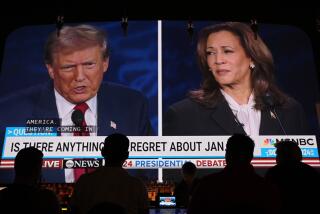Overall, a Convincing Winner
- Share via
President Bush’s handlers tried to minimize the significance of his three debates with Sen. John F. Kerry, exaggerating Bush’s lack of debating skills while insisting that he is the stronger leader. The trouble with this spin is that tens of millions of Americans watching the debates didn’t feel they were watching a mere academic exercise. Stitched together, these three extraordinary exchanges amounted to a powerful indictment of the president’s leadership.
Even on foreign policy and national security, supposedly the president’s strong suit, Kerry had Bush on the defensive in the first debate, attacking him for fighting an unnecessary war in Iraq while failing to capture Osama bin Laden and to prevent the acceleration of nuclear weapons programs in Iran and North Korea.
That the president was on the defensive again Wednesday night, in a debate devoted to domestic policy, is less surprising. Again, Kerry made a compelling case that, for all his plain-talkin’ West Texas bravado, Bush had failed to lead. When asked about healthy budget surpluses turning to huge deficits on his watch, the president said the nation needed “fiscal sanity in the halls of the Congress” in a plaintive tone that suggested he had as much influence over what happened there as he did over Jacques Chirac. But Bush’s loyal Republican lieutenants are running both chambers of Congress. Moreover, as Kerry noted in debate No. 2, Bush is about to become the first president since the 19th century who failed to veto a single bill in an entire four-year term. That is an abrogation of a president’s power to impose “fiscal sanity” on Congress.
Bush’s weakness as a leader was also manifest in his response to a question about why he failed to renew the ban on assault weapons, which he professed to support. He basically said he didn’t have the votes on Capitol Hill, even though the ban would have passed had GOP leaders allowed a vote, something Bush should have ordered.
That isn’t to say that Kerry has all the answers, or that Bush’s charm was not in evidence, particularly in Wednesday’s meeting. Kerry was in full pander mode on Social Security, and Bush was both profound and sincere in discussing his religious faith and its influence on his policies. But overall, Bush doesn’t have a strong hand, and both his opponent and his advisors know it. Bush led the nation to a war that much of the rest of the world, as well as a small majority of Americans, now thinks was unjustified. He wrecked the Treasury’s finances with reckless tax cuts that still failed to prevent him from becoming the first president since Herbert Hoover to preside over a net loss of jobs.
It’s no wonder the Bush team, hobbled by such a record, acts as if it can win only if voters treat this election as a referendum on Kerry’s fitness for office. It should be clear by now that Kerry is not for some Stalinist government healthcare system, that he won’t give Paris a veto over U.S. foreign policy and that he doesn’t think terrorism is merely a nuisance. He was thoughtful and firm in all three debates, despite his enduring stiffness. The shrillness of the Bush camp’s attacks on Kerry betrays an unbecoming desperation, and adds to the sense that the challenger came out the convincing winner.
More to Read
Get the L.A. Times Politics newsletter
Deeply reported insights into legislation, politics and policy from Sacramento, Washington and beyond. In your inbox twice per week.
You may occasionally receive promotional content from the Los Angeles Times.










